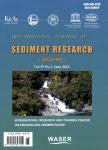The off-site implications of deforestation on sedimentation rates and pollution in Abkenar open water (Anzali Lagoon, Caspian Sea) using radionuclide techniques and sediment quality indices
The off-site implications of deforestation on sedimentation rates and pollution in Abkenar open water (Anzali Lagoon, Caspian Sea) using radionuclide techniques and sediment quality indices作者机构:Soil Conservation and Watershed Management Research Institute Agricultural Research Education and Extension Organization (AREEO) Soil and Water Management & Crop Nutrition Section Joint FAO/IAEA Division of Nuclear Techniques in Food and Agriculture International Atomic Energy AgencyVienna International Centre Guilan Agricultural and Natural Resources Research and Education CenterAREEO
出 版 物:《International Journal of Sediment Research》 (国际泥沙研究(英文版))
年 卷 期:2022年第37卷第3期
页 面:370-382页
核心收录:
学科分类:0709[理学-地质学] 0819[工学-矿业工程] 08[工学] 0818[工学-地质资源与地质工程] 0708[理学-地球物理学] 0903[农学-农业资源与环境] 0815[工学-水利工程] 0816[工学-测绘科学与技术]
基 金:the International Atomic Energy Agency (IAEA) Vienna for technical and financial support under the national TC project (grant number IRA5013)
主 题:Abkenar open water Accumulation rate Anzali Lagoon Sediment contamination CRS model Radioisotopes
摘 要:Abkenar open water(AOW) has a 35 km~2 distribution and is the largest part of the Anzali Lagoon in the southern coastal zone of the Caspian Sea. The effects of deforestation in the upstream basin of the AOW were assessed by measuring the rate of sedimentation, sediment contamination, and ecological risk for aquatic life and end-users using radioisotopes Cesium-137 and Lead-210. The chronology of the AOW sediment column was studied using the Constant Rate of Supply model. Correlations between environmental changes and the sedimentary regime of the study area highlight the contribution of the AOW authorized international and local wood harvesting companies pre-and-post 1950 in the catchment in terms of the rate of sediment supply and the influx of toxic metals. Historical evidence shows that two specific layers formed during World Wars I and II with the mean rates of 0.185 ± 0.04(±STD) and 0.32 ± 0.02 kg/(m·y), respectively. The highest influx of alkali elements and toxic metals(nickel, cadmium, lead, zinc, and copper) into the basin occurred in 1945. Two layers of gray mud(16-50 cm) and organic-rich dark loss mud(0-16 cm) correlated well with the programmed wood harvesting *** layers accumulated from 1953 to 2000 with a mean rate of 0.6 ± 0.2 and 2 ± 0.7 kg/(m~2·y). Thus,aquatic life and end-users have been exposed to moderate to extremely high levels of toxic metals and a moderate level of contamination since the 1950 s.



